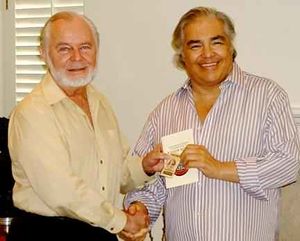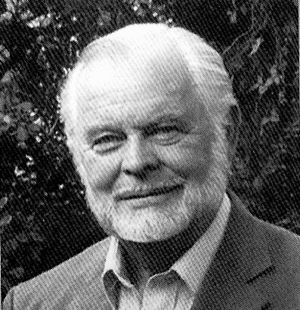G. Edward Griffin
G. Edward Griffin (born Nov. 7th 1931) is an American author and film maker. Griffin spreads several conspiracy theories concerning health and politics. He is the founder of „Freedom Force International“ and „Cancer Cure Foundation“.
Griffin advertises the dubious CAM methods without proof of efficacy Krebiozen and Amygdalin. In 1988 he believed to have found the Arche Noah using Radar near the Ararat, which endeared him to Creationists. However, after repeating the measurement later, nothing was found.[1]
Griffin also supports the refuted Hunza myth, claiming these pakistani mountain people would not suffer of cancer. Further claims are that they reach a higher age compared to north americans of up to 120 years.[2]
Note: G. Edward Griffin is not to be mixed up with Des Griffin or David Ray Griffin.
Conspiracy theories

Griffin believes that voting machines are used to manipulate elections and tries to have them replaced with ballots.
Griffin supports unconventional cancer therapies and the „Cancer Cure Foundation“. The layman Griffin supports in pseudoscientific publications in particular the ineffective Amygdalin (erroneously called vitamin B17 by him) as treatment for cancer. His website links to suppliers of this unapproved agent. According to Griffin cancer is caused by a lack of Amygdalin. He claims this agent is suppressed, which goes back to the activities of John D. Rockefeller. Certain world-wide high ranking persons would interfere with medical science, and are claimed to be responsible for the negative test results regarding Amygdalin. An article in American Journal of Public Health refuted this as conspiracy theory. A book by Griffin titled A world without cancer was pulled to pieces[3]. Griffin resorted to anecdotes of miracle healings instead of verifiable facts.
Versions of this article in other languages
- deutsch: G. Edward Griffin
References
- ↑ Collins, Lorence D., and Fasold, David (1996). "Bogus 'Noah's Ark' from Turkey Exposed as a Common Geologic Structure". Journal of Geoscience Education 44 (4): 439–444. [1]
- ↑ Griffin E: Eine Welt ohne Krebs, Kopp Verlag, Seite 73
- ↑ http://www.ajph.org/cgi/reprint/66/7/696-a.pdf
